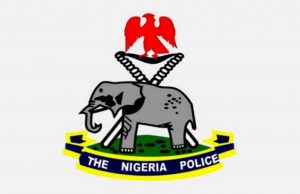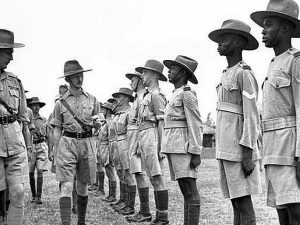Monthly and Annual Salary Of The Nigerian Police: The Nigerian Police Force (NPF) is a branch of the executive arm that is charged by the government with safeguarding the lives and property of its citizens. They are also responsible for enforcing Nigerian laws and statutes, as well as reducing public unrest. In order words, they are charged with the responsibility of protecting human rights and freedoms, combating crime, upholding public law and order, and ensuring public safety.
Established in 1820 as the country’s primary law enforcement and security force, the Nigerian police service began as a 1,200 strong-armed paramilitary when the Hausa Constabulary was established in 1876 and continued until 1930 when the northern and southern regional police forces amalgamated to form the colony’s first national police force, the Nigeria Police Force.

Currently under the command of IGP Adamu Muhammed, the 20th indigenous Inspector-General of Police, the NPF is a massive organization with 36 state commands, 12 zones, and seven administrative divisions. Finance and Administration, Operations, Logistics, Force Criminal Investigation Department, Training, Research and Planning, and Information and Communication Technology are its divisions, each of which is led by a Deputy Inspector General of Police.
Recommended: Salary of Lawyers in Nigeria 2023
History Of The Nigerian Police Force (NPF)
In 1879, an armed members of the paramilitary Hausa Constabularies was formed and in 1896, the Lagos Police was equally formed. In the same period, the Niger Coast Constabulary was formed under the newly proclaimed protectorate of Niger Coast in Calabar.
In 1888, the Royal Niger Company set up its constabulary in the northern part of Nigeria with headquarters at Lokoja. In the early 1900s, the Northern and Southern Nigeria protectorates were proclaimed and part of the constabulary of the Royal Niger Company were joined to the Northern Police and became part of it. Also, part of the constabulary of the Niger Coast became the Southern Police all for the purpose of colonization. At that same period, most police were associated with local governments (who are native authorities).

In early 1960s, during the First Republic, these police forces were first regionalised and nationalised as a single organization.
Today, it is the lead security and main law enforcement agency in Nigeria provided by the constitution (1999) as the Nigerian Police Force (NPF) with exclusive jurisdiction all over the country.
Recommended: OAU Cutoff marks for all courses 2024
Salary Structure Of The Nigerian Police (NPF) 2024
The Nigerian police force (NPF) is organized under a command (authority) structure that helps it maintain order and control. It’s further broken down into grades and steps. This helps officers of the same rank to be distinguished but also forms the basis of the Nigerian police salary structure. Therefore, the salary compensation of each officer is based on all of these structures and grades, among other factors.

In the Nigerian military, there are two forms of officers: commissioned and non-commissioned officers. The same applies to officers in the Nigerian police force (NPF) which are divided into two categories: commissioned and non-commissioned. Before becoming a police officer, commissioned officers must complete a five-year training program, and they are the officers in charge of the senior ranks.
Non-commissioned officers, on the other hand, are the rank and file, the most junior officers. Some positions are separated into two or more grade levels and steps. This scale of grades and steps designates a position on a scale of ranks or attributes. It aids in the differentiation of officers of the same rank. The command structure (ranks) and salary plan of the Nigerian Police Forces (NPF) are shown below.
Recommended: Monthly and annual salary of the Nigerian Navy 2024
The commissioned officers are as follows:
The Inspector-General of Police (highest rank in the Nigerian police hierarchy)
The Deputy Inspector-General of Police
The Assistant Inspector-General of Police
The Commissioner of Police (In-charge of contingents in a state)
The Deputy Commissioner of Police
The Assistant Commissioner of Police
The Chief Superintendent of Police
The Superintendent of Police
The Deputy Superintendent of Police
The Assistant Superintendent of Police
The Inspector of Police
The Non-commissioned officers are as follows:
Sergeant Major
Sergeant
Corporal
Constable
Recruit. (Least level in the Nigerian police hierarchy)

Also see: Salary of bankers in Nigeria and their allowances
Inspector-General of Police Salary
Because the Inspector General of Police is the highest-ranking officer and commander of the Nigerian police force, the country only has one serving Inspector-General at any given time. Because he is appointed by the president and the president has the power to fire him at any time, his position is essentially a political one.
In most cases, however, the IGP is appointed for a four-year tenure. If he isn’t fired, he will remain in office until the term ends, at which point he must resign and the president picks a new officer to take his place. In Nigeria’s police force, the IGP is the highest-paid officer.
IGP Salary per month: N711,450
IGP Salary per year: N8,537,980
Deputy Inspector-General of Police salary
The Deputy Inspector-General (DIG) of Police is the next-in-command after the IGP; there may be more than one DIG at any given moment.
Salary per month: N546,572.80
Salary per year: N5,997,022.50
Assistant Inspector-General of Police
The Assistant Inspector-General (AIG) of Police is the third-highest level in the Nigerian police service, behind the Director-General (DIG) (NPF).
Salary per month: N499,751.90
Salary per year: N5,997,022.50
Commissioner of police salary
The fourth rank is Commissioner of Police (CP), who is in control of a state’s contingents. He is the most powerful cop in the state.
Commissioner Of Police on Grade 15 (step6)
Salary per month: N302,970.50
Salary per year: N3,635,645.70
Commissioner Of Police on Grade 15 (step1)
Salary per month: N266,777.79
Salary per year: N3,201,333.48

Recommended: Best Secondary schools in Nigeria and their fees
Deputy Commissioner of police salary
Between the Assistant Commissioner and the Commissioner lies this position. In the absence of the state commissioner, the Deputy Commissioner assumes leadership. In day-to-day operations, he supervises the Assistant Commissioner of Police.
Deputy Commissioner Of Police On Grade 14 (step7)
Salary per month: N278,852.80
Salary per year: N3,346,233.50
Deputy Commissioner Of Police On Grade 14 (step1)
Salary per month: N242,715.65
Salary per year: N2,912,587.80
Assistant Commissioner of police salary
The sixth-highest level among Nigerian police senior officers is the Assistant Commissioner of Police. It is below the Deputy Commissioner and above the Chief Superintendent.
Assistant Commissioner Of Police Grade 13 (step10)
Salary per month: N212,938.20
Salary per year: N2,555,257.90
Assistant Commissioner Of Police Grade 13 (step1)
Salary per month: N183,185.73
Salary per year: N2,198,228.76
Recommended: Salary of doctors in Nigeria 2024
Chief Superintendent of Police salary
This is the police’s top intermediate officer and the seventh level of command. The chief superintendent of police is a higher ranking officer than the Superintendent.
Chief Of Superintendent Of Police On Grade 12 (step5)
Salary per month: N199,723.96
Salary per year: N2,396,687.52
Chief Of Superintendent Of Police on Grade 12 (step1)
Salary per month: N172,089.06
Salary per year: N2,065,068.72
Superintendent of police salary
Superintendent of Police in Nigeria is a position between Chief Superintendent and Deputy Superintendent of Police.
Superintendent Of Police On Grade 11 (step 10)
Salary per month: N172089.06
Salary per year: N2,065,068.72
Superintendent Of Police On Grade 11 (step1)
Salary per month: N161,478.29
Salary per year: N1,937,739.48
Deputy Superintendent of police salary
A Deputy Superintendent is a higher-ranking officer than an Assistant Superintendent.
Deputy Superintendent Of Police on Grade 10 (step10)
Salary per month: N170,399.70
Salary per year: N2,044,796.30
Deputy Superintendent Of Police On Grade 10 (step1)
Salary per month: N148,733.29
Salary per year: N1,784,799.48
Assistant Superintendent of Police salary
It’s the second-lowest rank among senior officers. It is higher than the inspector but lower than the superintendent.
Assistant Superintendent Of Police On Grade 09 (step10)
Salary per month: N156,318.39
Salary per year: N1,875,820.68
Assistant Superintendent Of Police On Grade 08 (step10)
Salary per month: N144,152.07
Salary per year: N1,875,820.68
Assistant Superintendent Of Police On Grade 09 (step1)
Salary per month: N136, 616.06
Salary per year: N1,639,392.72
Assistant Superintendent Of Police On Grade 08 (step1)
Salary per month: N127,604.68
Salary per year: N1,531,256.16
Recommended: Causes, Effects and Solutions to brain drain in Nigeria
Inspector of police salary
After completing commissioned officer training, a cadet Inspector is the lowest rank held by a police officer. Inspector of Police (IP) is the popular name for this position.
Cadet Inspector On Grade 07 (step10)
Salary per month: N87,135.10
Salary per year: N1,045,628.10
Cadet Inspector On Grade Level 07 (step1)
Salary per month: N73,231.51
Salary per year: N878,778.12
Sergeant major salary
Sergeant Major (SM) is the Nigerian police force’s twelfth rank and the first of the rank and file subordinate officers (NPF). It is the non-commissioned officer’s highest rank. A Sergeant Major assists the regiment’s administrative officer.
Sergeant Major On Grade 06 (step 10)
Salary per month: N62,204.88
Salary per month: N746,458.56
A Sergeant Major On Grade 06 (step 1)
Salary per month: N55.144.81
Salary per year: N661.737.72
Also see: List of schools that accept second choice candidates in Nigeria 2024
Sergeant salary
A non-commissioned officer’s middle rank is the sergeant. A police sergeant is a lower-ranking officer than a sergeant major.
Police Sergent On Grade 05 (step 10)
Salary per month: N55,973.90
Salary per year: N671,686.10
Police Sergeant On Grade 05 (step1)
Salary per month: N48.540.88
Salary per year: N582,490.56
Corporal salary
After constable, this is the lowest level in the police service.
Police Corporal On Grade Level 04 (step 10)
Salary per month: N51,113.60
Salary per year: N613,365.10
Police Corporal On Grade 04 (step 1)
Salary per month: N44,715.53
Salary per year: N536.586.36
Recommended: Best apps for lawyers and law students
Constable salary
A newly hired police officer is known as a Police Constable. According to reports, it is the lowest rank in the Nigerian police force. It is also divided into two grades;
Police Constable Grade Level 03
Salary per month: ₦43, 293.80
Annual Salary: ₦519,525.6
Police Constable Grade Level 10
Salary per month: ₦51,113.59
Annual Salary: ₦613,363.08
Police recruit Salary
A police recruit is someone who is training to become a police officer. Because a person here is simply a trainee, it is not technically a police rank.
Salary per month: ₦9,019.42
Annual Salary: ₦108,233
Also see: Best universities to study medicine in south africa 2024
Are Nigerian Police Officers Paid Very Well?
Undoubtedly, the Nigerian Police is not paid very well when compared with other professions and the salary of the police force in other countries. In fact, the Nigerian police are one of the most less paid institutions in the world. The worst of it all is the fact that, members of the police are being owed by the government.
This is why the Nigerian police are is also one of the most corrupt in the world. Nowadays, the police try as much as possible to extort some money from citizens just to have something to keep up with their wellbeing when the government fails to pay them at the end of the month.
Recently, the Nigerian Police Force even threatened to go on strike if the Government fails to pay them. This goes a long way to show how bad the situation is in Nigeria currently. The only way a Nigerian police officer can increase his pay is not to join the police force except it is a last resort. Aside this, another option is to remain patriotic until a better government comes into power.
Recommended: Origin and History of the nigerian army
Other Interesting Facts About the Nigerian Police Force
1. The Nigerian Police Force is Over a Century Old: Let’s start with the most obvious fact. This security body is old. It is the oldest law enforcement and security agency in the country and was around even before the country became independent.
The history of the police force starts with the formation of different constabularies, including the Lagos police that was established in the 1960s. These constabularies would go through various changes mirroring that of the country’s history until the 1960s.
After Nigeria gained her independence, the different constabularies were nationalised and that is how the Nigerian Police Force became the leading security body in the country.
2. The Nigerian Police Force Was Recognized in The 1999 Constitution: With the emergence of the 1999 constitution, the Nigerian Police Force was further recognized as the national police of the country and given exclusive jurisdiction over the country.
This recognition would further cement the agency’s role as the leading security outfit of the country. It would also widen the scope of its duties, demanding an increase in the workforce.

3. The Nigerian Police has a Workforce above 300,000: The Nationalisation of the Nigerian Police Force certainly meant an increase in workforce. But the sheer number of staff would probably leave you astonished.
As of 2016, the Nigerian Police Force had a workforce of about 371,000. This is a massive number, implying that each state has roughly about 10000 police officers. The federal government also has plans of increasing this number by 280,000 leading to a total staff strength of 608,000.
4. The Nigerian Police Might be The Most Hated Security Outfit In The Country: Enter a police station, and you are sure to find the words “the police is your friend,” written somewhere. However, have a short discourse with a Nigerian youth and they would probably describe the security body as their worst nightmare.
This is largely due to the corruption within the force. This has caused a lack of public confidence. It didn’t help matters that it seemed the police were more suited for paramilitary operations than the more unmilitary functions like crime detection, prevention, and investigation.
There were several reports on the excessive use of violence especially towards the youth, sexual abuse, and collusion with criminals. These accusations have persisted despite several attempts at an overhaul by the authorities.
Recommended: Countries with the worst justice system in the world
5. The Nigerian Police Reform Bill
This is the latest attempt by the Nigerian government to curb the many lapses of the Nigerian Police Force in performing its duties. It passed the mandated reading in the National Assembly and was signed into law on September 16, 2020 by President Muhammadu Buhari.

The goal was to create a more effective police force through accountability and transparency. It was also meant to tackle the challenges the force was facing. Sadly, less than a month later, Nigerian youths would take to the streets demanding the disbandment of a particular squad of the Nigerian Police Force.
6. The End of SARS and the Beginning of SWAT
Nigerian youth took to the streets in Lagos, and other states across the country, demanding the dismantling of the Special Anti-Robbery Squad (SARS). They accused this squad of different heinous crimes including, rape, extortion, torture, and murder.

After a bloody encounter at the Lekki Toll gate, the Government seemed to listen to the cries of the people. SARS was dismantled and SWAT was created to replace the body as the country’s tactical unit.
Recommended: Top 10 Strongest Military Force in Africa
Conclusion
The Nigerian Police Force has a well-structured and ordered remuneration scheme for its employees based on the Nigerian Police Salary Structure to make personnel payment simple and transparent. A Nigerian police officer’s salary is largely determined by his or her position and grade within the force.

Edeh Samuel Chukwuemeka, ACMC, is a lawyer and a certified mediator/conciliator in Nigeria. He is also a developer with knowledge in various programming languages. Samuel is determined to leverage his skills in technology, SEO, and legal practice to revolutionize the legal profession worldwide by creating web and mobile applications that simplify legal research. Sam is also passionate about educating and providing valuable information to people.
That’s good pay for police officers. God bless Nigeria!
We are in a country fully with lies and deceived, Can you Imagine, that uptil now the NPF have not been pay the approved New salary, Nigerian should stop saying what they did not know, that the police have started enjoying their new salary said by the minister of labour Christ Igige,can you imagine this false information from a minister.on the 18/5/2022 the minister of police affairs said, that the arrangements for payment of the police New approved salary by Mr President has since been concluded and forwarded to the minister of fan, for Payment since last month April 2022,my fellow Nigerian can you see what the NPF are going through serving there country.you may find out your self , It has been dely tactics,May God save our Nigeria leader It is well.